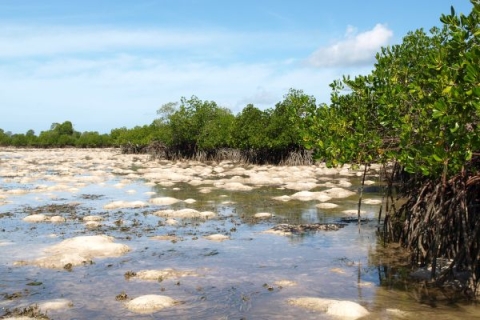
Research in the Solent could help find an answer to a growing micro plastic pollution crisis in South East Asia. That’s the hope of researchers from the University of Portsmouth, who are beginning their part of a three year £1.5million project.
The team from Hampshire should be out in the mangrove ecosystems on the shores of Indonesia, Vietnam, the Philippines and Singapore. However, Covid restrictions mean they can’t travel. Despite this setback the scientists still need to develop a protocol for taking samples in their search for new ‘plastic eating’ enzymes.
University researchers will use a special sampling tool to cut through tough root systems in salt marshes around Portsmouth, Chichester and Farlington Harbour. It will also give them the opportunity to measure micro plastic pollution in their own part of the world.
Professor Simon Cragg from the School of Biological Sciences explains: “It would be great to be starting our work directly in South East Asia, but the next best thing just happens to be on our doorstep. The salt marshes around the Solent share crucial similarities with mangrove swamps. The lessons and methods that we learn on the South Coast will be shared with scientists on the other side of the world who will carry out the work remotely. The samples they gather will be put onto filters and sent back to Portsmouth, where our specialist labs will analyse them.”
The lessons and methods that we learn on the South Coast will be shared with scientists on the other side of the world who will carry out the work remotely. The samples they gather will be put onto filters and sent back to Portsmouth, where our specialist labs will analyse them.
Professor Simon Cragg, School of Biological Sciences
The University of Portsmouth is already working on natural enzymes discovered in a Japanese rubbish dump that can help ‘digest’ and recycle single-use plastics.
Researchers reason that mangrove sediments are a promising place to seek further plastic eating enzymes, because mangrove roots and leaves are protected by coatings with chemical similarities to plastics. The coating is broken down by microbes in the sediment, where there are also copious microscopic fragments of plastics, so microbes could shift from mangrove plant detritus to plastic as a source of energy.
The scientists want to see if the microbes that also coat plastic found in the ecosystem could be useful in their quest for finding a faster acting solution to the pollution problem.
In addition to searching for a new enzyme, the samples taken in the mangrove swamps will allow researchers to see how bad the problem of micro plastics is in South East Asia. This is the first aim of a three-year project that has been set up to understand the impact of plastic pollution on marine ecosystems in the region. It is funded by UK’s Natural Environment Research Council (NERC) and Singapore’s National Research Foundation (NRF), with UK Government funding supported by the Department for Business, Energy and Industrial Strategy (BEIS).
The project involves world-leading researchers, policy groups and community leaders in the UK, Singapore, Indonesia, the Philippines and Vietnam. The University of Portsmouth is recognised as being a global front-runner in developing policy and research into plastic waste. Professor Steve Fletcher, Director of the University’s Revolution Plastics initiative, said: “I’m delighted we’re able to push on with this vital research, despite the barriers to travel. It’s more crucial than ever that we build a picture of the amount of micro-plastics in our marine environments, and come up with solutions to reduce the impact on our planet.”
